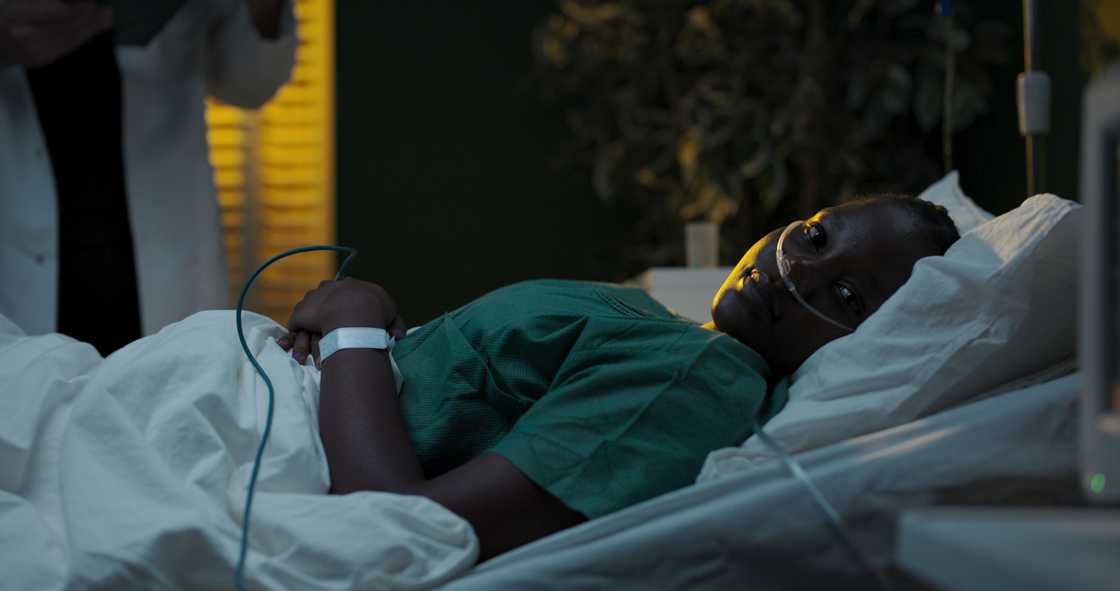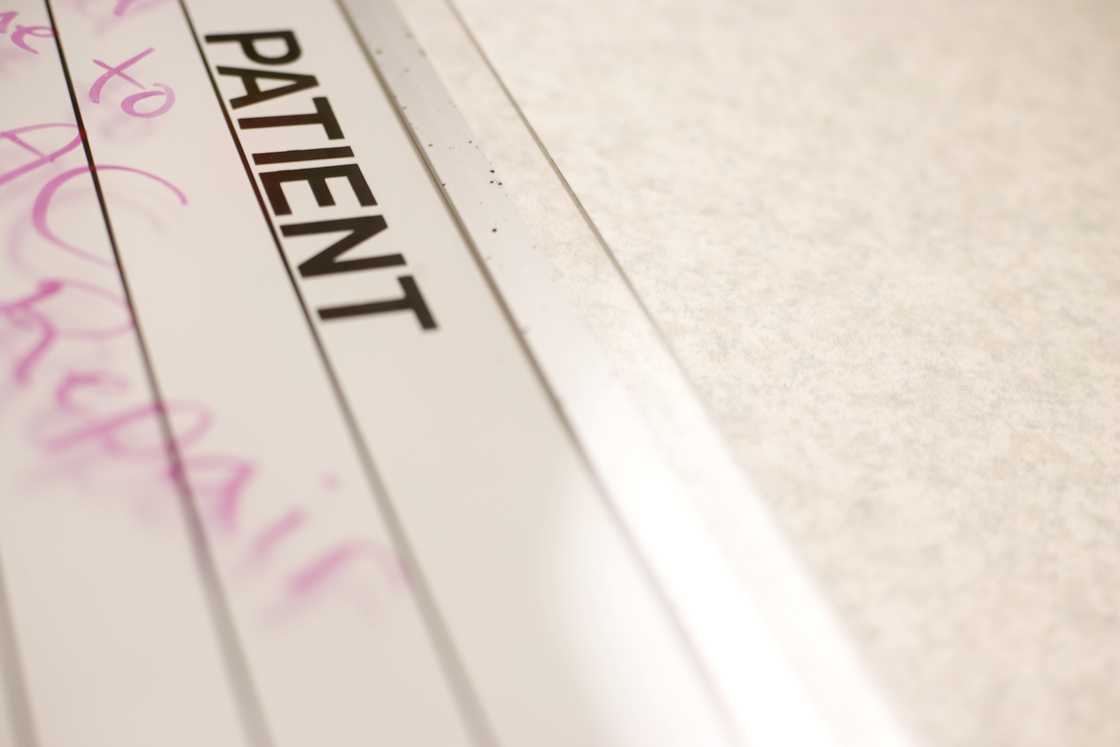The whisper travelled faster than the drip of my IV. “She failed the test,” someone said, too loud to be private, too soft to challenge. I was lying in the postnatal ward of a public hospital in Surulere, my baby still in the nursery. My body ached, my emotions raw from labour, and yet those four words cut deeper than any contraction.

Source: Getty Images
Failed what test?
A nurse passed by without meeting my eyes. Another one whispered to her colleague, glancing in my direction. My stomach tightened. Something was wrong, and nobody wanted to tell me.
Hours earlier, I had delivered a healthy baby girl after twelve hours of labour. She had cried immediately, her tiny fingers curling around the nurse’s glove. I thought the most challenging part was over. I was wrong.
Now, as the ward lights flickered above me, the same nurse who had congratulated me earlier stood at the foot of my bed holding a file. Her tone had changed.
“Madam, you will not room-in with your baby yet,” she said.
My heart skipped. “Why? Is she alright?”
“She is fine. But we need to confirm something first.”
“What thing?” I asked.
“Your test results,” she said quietly, closing the file.
Minutes later, my husband, Sola, arrived. I told him what had happened. His smile faded.

Source: Getty Images
We went to the nurses’ station together. They exchanged uneasy glances. Finally, one said, “Social welfare has to clear you first.”
I felt my chest tighten. “Clear me? For what?”
The nurse lowered her voice. “It’s about your screening, Madam. They said you tested positive for… something.”
The hallway went quiet. I could feel eyes on me. A whisper started again, faint but sharp: She failed the test.
That was the night I learned that in a hospital, rumours can spread faster than recovery, and silence can be more dangerous than sickness.
Before that day, I thought I had done everything right.
I was a first-time mum, twenty-eight, and meticulous about my pregnancy. From the first missed period, I went straight to the antenatal clinic at Surulere General Hospital. I attended every class, kept every appointment, and took every supplement.

Source: Getty Images
The nurses knew me by name. I carried my antenatal card like an ID badge, flipping it open at every visit. They neatly circled my blood pressure readings, my scans stapled in sequence, my due date underlined twice.
I had planned for a normal delivery, packed my hospital bag two weeks early, and even practised breathing exercises with my husband every night.
My friends teased me. “You and this your organised spirit,” they said. “You’ll end up running the maternity ward.”
I laughed, proud of my preparation. But nothing prepares you for how unpredictable birth can be.
When labour started, it came like an ambush; steady, intense, unrelenting. By the time Sola rushed me to the hospital, I could barely speak. Twelve hours later, I held my daughter in my arms, exhausted but overjoyed.

Source: Getty Images
She was perfect: tiny, warm, and already frowning like her father.
The midwives congratulated me, and someone said, “We’ll take the baby for routine checks.” I nodded, half-asleep.

Read also
Elderly woman disappointed after she was sacked from Nana Konadu’s residence for crying too loudly
When I woke hours later, my bed was empty beside me. No cot. No baby. Only a plastic tag around my wrist and a lingering ache between my ribs.
I pressed the call bell. A nurse came in, expression blank.
“Madam, your baby is in the nursery,” she said.
“Why? She’s healthy, right?”
“Yes. But we are still reviewing your test results.”
That day marked the first time I heard the phrase test results; and everything shifted. It sounded simple, routine. I assumed they meant the usual post-delivery screenings.
But by morning, my meals arrived late, they checked my vitals less often, and the nurses stopped chatting with me. Conversations went quiet when I passed. One even changed her gloves twice after touching my chart.

Source: Getty Images
When I asked to see my baby, they said, “Not yet.”
And when Sola came that afternoon, a nurse pulled him aside before letting him in.
I sensed that whatever they had written in that file was bigger than paperwork.
By the second day, the whispers had grown louder than the monitors.
“She failed the test,” someone repeated near the door.
Another nurse muttered, “Social welfare will handle her case.”
Handle me? For what?
I felt anger rising with confusion. My body was healing from stitches, and my mind was fighting panic. I asked again to see my baby.
“Not yet, Madam,” the senior nurse said. “There are procedures.”
“What procedures? You people are not telling me anything!”
Her tone hardened. “Madam, calm down. It’s for your safety and the baby’s.”
Tears blurred my vision. “At least tell me what test I failed.”

Source: Getty Images
She looked at the floor. “It’s your screening.”
“What screening?”
“Your initial blood panel. There was a reactive result. We are waiting for confirmation.”
I felt dizzy. “Reactive to what?”
“Please, let the doctors explain,” she said, walking away
Sola appeared minutes later, face tense. “What’s going on?” he demanded.
“They said I failed a test,” I whispered.
He went to the counter, voice raised. “What test? We paid for every lab, every scan. You people should explain yourselves!”
The matron intervened. “Sir, calm down. It might be a false positive, but we must confirm before we release the baby.”
Sola’s hands clenched. “Are you accusing my wife of something?”
“No one is accusing anyone,” she replied. “We just follow protocol.”
But by then, it was too late. The other mothers in the ward had overheard. I saw them shift their babies closer, eyes filled with suspicion.

Source: Getty Images
One whispered, “Maybe it’s narcotics.”
Another said, “Or that sickness.”
I felt the air leave my lungs. I wanted to scream, to vanish.
Sola paced the corridor, making calls. He spoke to a resident doctor, who promised to “check the system.” Hours passed. The drip ran dry. I sat staring at my empty hands.
When night fell, I begged a junior nurse for news of my baby. She hesitated before whispering, “Your baby is fine, Madam. She’s sleeping. They just want to be sure about you.”
Her kindness made me cry.
The next morning, a social welfare officer arrived with a clipboard in her hands. She asked questions about my “medical history,” my job, and my husband’s occupation. I answered, trembling.
Finally, she said, “We are waiting for the lab to clarify. Until then, you remain under observation.”
That was when Sola decided to act.

Source: Getty Images
“I’m going to the lab myself,” he said.
“Will they even talk to you?” I asked weakly.
He adjusted his shirt. “They will. I’ll find the person in charge.”
He left before I could stop him.
Two hours later, Sola returned with a look I had never seen before: relief mixed with disbelief.
He was holding a letter, printed on official letterhead.
“I spoke to the laboratory head,” he said. “He reviewed your file. It was a cross-reaction error.”
I blinked. “Cross-reaction?”
“Yes. The screening showed a false positive for a controlled substance. But the confirmatory test came back negative. No banned substances detected. You are completely clear.”
He handed me the letter with my name typed neatly at the top. The memo read:
Subject: Clarification of Screening Result
The initial reactive test resulted from a non-specific cross-reaction. Subsequent confirmatory analysis revealed no banned substances or infections. We have medically cleared the patient for standard postnatal care and mother-baby bonding.
Signed: Dr Bello, Head of Laboratory Services.

Source: Getty Images
I exhaled so deeply I felt my stitches ache.
Sola kissed my forehead. “I told them you did nothing wrong.”
Minutes later, he took the letter to the consultant obstetrician. Within an hour, the memo was photocopied and pinned to the ward board.
The senior nurse who had avoided my gaze now stood beside my bed. “Madam, we are so sorry for the misunderstanding,” she said quietly.
Another nurse wheeled in the bassinet. Inside, they had wrapped my baby in a pink blanket: her tiny chest rising and falling.
When they placed her on my chest for Kangaroo Mother Care, I broke down completely.
The consultant entered shortly after. “Madam, this was an unfortunate delay. The first screening used an automated analyser that sometimes reacts to common pregnancy medications. The confirmation test showed you are completely fine.”

Source: Getty Images
I nodded through tears. “You should tell people faster next time. The whispers nearly destroyed me.”
He looked genuinely sorry. “We will improve our communication. We’ve already issued an internal circular.”
That evening, I sat upright for the first time in days, watching my daughter sleep against my skin. The warmth of her body felt like forgiveness to me.
When the junior nurse came to check on us, she whispered, “You are very strong, Madam. Many people would have shouted.”
I smiled faintly. “I shouted inside.”
By the next morning, the ward had changed for the better. The same staff who once avoided me now smiled kindly when they passed. The consultant made another round, stopping by my bed to reassure me that the incident had triggered a review of hospital protocol.
He said, “We have learned something valuable. A rumour can travel faster than a result. From now on, no result will be discussed without verification.”

Source: Getty Images
Later, I saw the memo pinned to the noticeboard near the nurses’ station. It was signed and stamped, visible to everyone.
In bold letters, it read:
CLARIFICATION: NO SUBSTANCE DETECTED. PATIENT CLEARED.
Nurses who had whispered before now offered help with my stitches, even small jokes about baby names. One said, “We owe you a better apology than words.”
Sola brought in bottled drinks for the staff as a peace gesture. The matron accepted them with gratitude.
That afternoon, they moved my baby and me to Kangaroo Mother Care. The nurse explained, “Skin-to-skin contact helps regulate her heartbeat and keeps her warm.”
As my baby rested against me, I realised that truth, once documented, carried more weight than gossip.
When the hospital finally discharged us, the head nurse said softly, “You handled this with grace. We are sorry you went through that.”

Source: Getty Images
I thanked her. “Please remember this next time. Not every rumour deserves a whisper.”
Sola quietly laughed as we walked out. “You just gave them a new training topic.”
Maybe I did.
Looking back, I have learned that truth travels slower than gossip. But when it finally arrives, it must come with evidence.
In our hospitals, where fear and stigma can spread faster than facts, a single whisper can break a patient’s spirit. Sometimes all it takes to restore dignity is a written clarification, a memo pinned to a wall.
I do not blame the nurses. They are overworked, underpaid, and human. But I wish someone had looked me in the eyes sooner and said, “It’s being checked, don’t worry.” That small kindness could have saved me days of silent pain.

Source: Getty Images
The experience changed how I see healthcare and people. I now understand that communication is as healing as medicine.
My daughter is now six months old, healthy and loud. Sometimes, when I hold her against my chest, I think of those long days in the ward and how close I came to losing the joy of our first bond.
So I ask you, reader: when next you hear a whisper about someone, will you repeat it, or will you wait for the memo?
Because truth may travel slowly, but it deserves a voice louder than rumour.
Sometimes, we save a life not with medicine but by having the courage to speak out with clarity.

Read also
Ghanaian woman gets emotional as her son reports to school as a first-year student, video trends
This story is inspired by the real experiences of our readers. We believe that every story carries a lesson that can bring light to others. To protect everyone’s privacy, our editors may change names, locations, and certain details while keeping the heart of the story true. Images are for illustration only. If you’d like to share your own experience, please contact us via email.
Source: YEN.com.gh
Source: Yen.com.gh



















